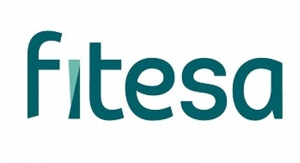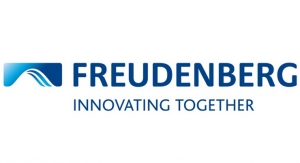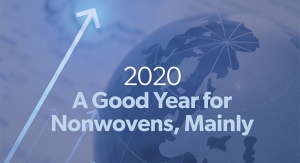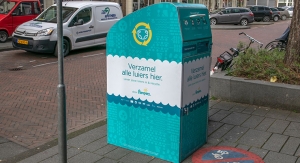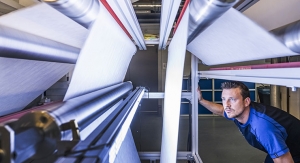09.11.17
Gravatai, Brazil
www.fitesa.com
2017 Nonwovens Sales: $838 million
Key Personnel
Silverio Baranzano, CEO; Hal Singley, CFO
Plants
Gravataí, Brazil; Cosmópolis, Brazil; Lima, Peru; San Jose Iturbide, Mexico; Simpsonville, USA/SC; Green Bay, USA/WI; Washougal, USA/WA; Norrkoping, Sweden; Peine, Germany; Trezzano Rosa, Italy; Sulmona, Italy; Tianjin, China; Ras Al-Khaimah, UAE; Rayong, Thailand
Processes
Spunbond, SMS, bicomponent spunbond, meltblown, carded (chemical bonded, thermal bonded, air through bonded), airlaid, elastic films & laminates, perforated films, nonwovens and composites
Major Markets
Hygiene, medical and industrial specialties (filtration, agricultural, sorbents)
Fitesa, Brazil’s largest nonwovens manufacturer, is poised to extend its manufacturing footprint into Southeast Asia. In July, the company acquired a 51% stake of spunbond nonwovens maker CNC International. The Rayong, Thailand-based company largely serves the Southeast Asian markets from two sites in Rayong and a sales office in Tokyo, Japan. It will now be known as FitesaCNC. The joint venture will focus on the hygiene market – in line with the rest of the Fitesa business.
CNC’s last major investment was a 24,000-ton Reicofil 4 production line in 2013 and its current capacity is thought to be about 40,000 tons per year. Owned by the CPPC Group, which falls under the umbrella of Charoen Pokphand Group (CP), the largest agriculture-based conglomerate in Thailand, CNC was founded in 1994 when CPPC decided to diversify into nonwovens.
Originally founded as a 50/50 joint venture company between Fitesa’s former partner Fiberweb and CPPC, CPPC purchased all of the shares of CNC in late 2006. At the time of this purchase, executives referred to the move as a clear example of its intention of having CNC grow along with its key customers in the region.
Fitesa did not comment on the value of the transaction nor the company’s revenues, but executives did say the acquisition represents the company’s first step into one of the world’s fastest growing regions for spunbonded nonwovens and hygiene products.
While this is Fitesa’s first Asian investment, the company has aggressively invested in the Americas and Europe in recent years, adding lines with a total of 140,000 metric tons of capacity in the U.S., Mexico, Brazil, Sweden and Germany since 2015. In 2017, sales growth reflected this investment, increasing from $708 million to $838 million.
“Since 2005, Fitesa has been growing its market share and production capacity at exponential rates, having invested in 16 new lines and two greenfield lines,” Mariana Mynarski, global marketing, says. “We accredit this impressive growth to our talented and experienced team, a well-designed and executed strategy and the commitment of our shareholders with the future of the business.”
Demand for Fitesa’s main product, spunmelt nonwovens, continues to grow in the low- to mid-single digit range, depending on the geography and sales have risen accordingly. In mature markets such as North America and Europe baby care shows zero or very moderate growth rates.
However, a growing aging population drives growth in adult incontinence applications. Asia presents higher growth rates, mostly driven by baby diapers, while Latin America currently sees a lower growth, affected by macro conditions in the region.
While the Latin American region is challenged by some economic factors, Fitesa considers the hygiene market demand to be stable, and expects it to recover. In 2016, the company added a new plant in Cosmopolis (Brazil), located 135 kilometers from the city of Sao Paulo, allowing it to strengthen its presence in the Southeast region of the country.” The Cosmopolis plant is providing a more responsive service to our customers’ demands in the region,” Mynarski says. “In addition, this factory features Latin America’s first bicomponent spunbond production line, able to manufacture some of Fitesa’s most innovative products.”
In February 2017, Fitesa diversified outside of spunmelt nonwovens production through the acquisition of Pantex, a manufacturer of elastic films & laminates, perforated films, nonwovens and composites from Italian private equity firm Qualdrivio Capital. Based in Italy, Pantex also has operations in South Carolina and the UAE.
“Fitesa and Pantex have complementary product lines, which expands our portfolio and allows us to provide a more comprehensive and integrated solution to our customers,” Mynarski says.
Amidst this growth, sustainability continues to be a top priority for Fitesa.
In 2017, the company launched its updated Sustainability Policy, which advocates responsible management of natural resources and commits to working toward a sustainable society. In it, Fitesa approaches from complying with all legal requirements to reduce its environmental impact and increase its social contribution. The main environmental impacts addressed in the policy are the consumption of electricity, CO2 emission and waste disposal.
“Most of the nonwoven fabrics we produce are made from polypropylene and polyethylene derived from oil and natural gas, non-renewable goods that tend to become increasingly scarce in the future,” Mynarski says. “Therefore, one of our engineers’ main focus of research and innovation is the development of sustainable nonwoven fabrics. We have been producing such sustainable nonwoven fabrics successfully for over 10 years.”
And, research and development efforts are poised to continue strong as Fitesa has recently completed work on pilot lines at innovation centers in Peine, Germany, and Sulmona, Italy, and is in the final phases of starting up a new Innovation Center in Simpsonville, SC.
www.fitesa.com
2017 Nonwovens Sales: $838 million
Key Personnel
Silverio Baranzano, CEO; Hal Singley, CFO
Plants
Gravataí, Brazil; Cosmópolis, Brazil; Lima, Peru; San Jose Iturbide, Mexico; Simpsonville, USA/SC; Green Bay, USA/WI; Washougal, USA/WA; Norrkoping, Sweden; Peine, Germany; Trezzano Rosa, Italy; Sulmona, Italy; Tianjin, China; Ras Al-Khaimah, UAE; Rayong, Thailand
Processes
Spunbond, SMS, bicomponent spunbond, meltblown, carded (chemical bonded, thermal bonded, air through bonded), airlaid, elastic films & laminates, perforated films, nonwovens and composites
Major Markets
Hygiene, medical and industrial specialties (filtration, agricultural, sorbents)
Fitesa, Brazil’s largest nonwovens manufacturer, is poised to extend its manufacturing footprint into Southeast Asia. In July, the company acquired a 51% stake of spunbond nonwovens maker CNC International. The Rayong, Thailand-based company largely serves the Southeast Asian markets from two sites in Rayong and a sales office in Tokyo, Japan. It will now be known as FitesaCNC. The joint venture will focus on the hygiene market – in line with the rest of the Fitesa business.
CNC’s last major investment was a 24,000-ton Reicofil 4 production line in 2013 and its current capacity is thought to be about 40,000 tons per year. Owned by the CPPC Group, which falls under the umbrella of Charoen Pokphand Group (CP), the largest agriculture-based conglomerate in Thailand, CNC was founded in 1994 when CPPC decided to diversify into nonwovens.
Originally founded as a 50/50 joint venture company between Fitesa’s former partner Fiberweb and CPPC, CPPC purchased all of the shares of CNC in late 2006. At the time of this purchase, executives referred to the move as a clear example of its intention of having CNC grow along with its key customers in the region.
Fitesa did not comment on the value of the transaction nor the company’s revenues, but executives did say the acquisition represents the company’s first step into one of the world’s fastest growing regions for spunbonded nonwovens and hygiene products.
While this is Fitesa’s first Asian investment, the company has aggressively invested in the Americas and Europe in recent years, adding lines with a total of 140,000 metric tons of capacity in the U.S., Mexico, Brazil, Sweden and Germany since 2015. In 2017, sales growth reflected this investment, increasing from $708 million to $838 million.
“Since 2005, Fitesa has been growing its market share and production capacity at exponential rates, having invested in 16 new lines and two greenfield lines,” Mariana Mynarski, global marketing, says. “We accredit this impressive growth to our talented and experienced team, a well-designed and executed strategy and the commitment of our shareholders with the future of the business.”
Demand for Fitesa’s main product, spunmelt nonwovens, continues to grow in the low- to mid-single digit range, depending on the geography and sales have risen accordingly. In mature markets such as North America and Europe baby care shows zero or very moderate growth rates.
However, a growing aging population drives growth in adult incontinence applications. Asia presents higher growth rates, mostly driven by baby diapers, while Latin America currently sees a lower growth, affected by macro conditions in the region.
While the Latin American region is challenged by some economic factors, Fitesa considers the hygiene market demand to be stable, and expects it to recover. In 2016, the company added a new plant in Cosmopolis (Brazil), located 135 kilometers from the city of Sao Paulo, allowing it to strengthen its presence in the Southeast region of the country.” The Cosmopolis plant is providing a more responsive service to our customers’ demands in the region,” Mynarski says. “In addition, this factory features Latin America’s first bicomponent spunbond production line, able to manufacture some of Fitesa’s most innovative products.”
In February 2017, Fitesa diversified outside of spunmelt nonwovens production through the acquisition of Pantex, a manufacturer of elastic films & laminates, perforated films, nonwovens and composites from Italian private equity firm Qualdrivio Capital. Based in Italy, Pantex also has operations in South Carolina and the UAE.
“Fitesa and Pantex have complementary product lines, which expands our portfolio and allows us to provide a more comprehensive and integrated solution to our customers,” Mynarski says.
Amidst this growth, sustainability continues to be a top priority for Fitesa.
In 2017, the company launched its updated Sustainability Policy, which advocates responsible management of natural resources and commits to working toward a sustainable society. In it, Fitesa approaches from complying with all legal requirements to reduce its environmental impact and increase its social contribution. The main environmental impacts addressed in the policy are the consumption of electricity, CO2 emission and waste disposal.
“Most of the nonwoven fabrics we produce are made from polypropylene and polyethylene derived from oil and natural gas, non-renewable goods that tend to become increasingly scarce in the future,” Mynarski says. “Therefore, one of our engineers’ main focus of research and innovation is the development of sustainable nonwoven fabrics. We have been producing such sustainable nonwoven fabrics successfully for over 10 years.”
And, research and development efforts are poised to continue strong as Fitesa has recently completed work on pilot lines at innovation centers in Peine, Germany, and Sulmona, Italy, and is in the final phases of starting up a new Innovation Center in Simpsonville, SC.



